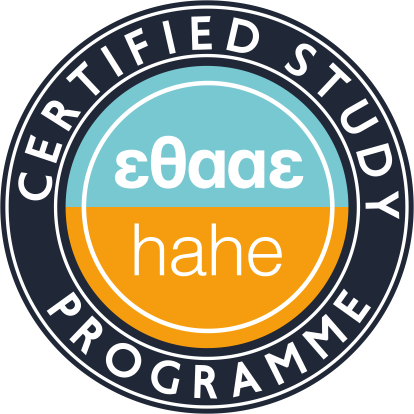After completing the course, it is expected that students will be able to:
To understand the way in which social and economic systems operate governed by behavioral dynamics and by interactions between actors, to think strategically, to understand the basic concepts and mathematical techniques of Game Theory and Decision Making, to understand strategic interactions in real situations, to critically use the methods of strategic analysis offered by Game Theory, to interpret the behavior and strategies of businesses in their microeconomic and spatial context, to constructively use the principles and methods of Game Theory to interpret and model economic and real-world and market business problems, understand key business decision-making issues arising from incomplete information, identify optimal strategies in business operations in markets, international relations, and various policy fields, and propose effective strategies for dealing with decision-making problems in different functional areas of the market and social life.
Η βασική βιβλιογραφία που θα χρησιμοποιηθεί είναι
Ελληνόγλωσση Βιβλιογραφία
- McCain Roger A. (2019) Θεωρία Παιγνίων, Broken Hill Publishers Ltd
- Ε.Χ. Φούντας, Α.Γ. Βλάχος (2013) Μαθηματικός Προγραμματισμός και Θεωρία Παιγνίων 1, Μαρκέλλα Ι. Βαρβαρήγου
- Νεάρχου Α., (2016) Εισαγωγή στη Θεωρία Παιγνίων, Εταιρεία Αξιοποίησης και Διαχείρισης Περιουσίας Πανεπιστημίου Πατρών.
- Βολιώτης, Δ., (2015) Διαλέξεις στη Θεωρία Παιγνίων, Πεδίο Εκδοτική.
Ξενόγλωσση Βιβλιογραφία
- Gibbons, R. S. (1992). Game theory for applied economists. Princeton University Press.
- McMillan, J. (2013). Game theory in international economics. Taylor & francis.
- Ordeshook, P. C. (1986). Game theory and political theory. Cambridge Books.
- Ichiishi, T. (2014). Game theory for economic analysis. Elsevier.
- Barron, E. N. (2013). Game theory: an introduction (Vol. 2). John Wiley & Sons.
- Webster, T. J. (2018). Introduction to game theory in business and economics. Routledge.
- Schmidt, C. (Ed.). (2002). Game theory and economic analysis: A quiet revolution in economics. Routledge.
Ενδεικτική Αρθρογραφία
- Roth, A. E. (2002). The economist as engineer: Game theory, experimentation, and computation as tools for design economics. Econometrica, 70(4), 1341-1378.
- Samuelson, L. (2016). Game theory in economics and beyond. Journal of Economic Perspectives, 30(4), 107-30.
- Roth, A. E. (1991). Game theory as a part of empirical economics. The Economic Journal, 101(404), 107-114.
- Buchanan, J. M. (2001). Game theory, mathematics, and economics. Journal of Economic Methodology, 8(1), 27-32.
- Agrawal, R. C., & Heady, E. O. (1968). Applications of game theory models in agriculture. Journal of agricultural economics, 19(2), 207-218.
- Abbott, P. C. (1996). Implications of game theory for international agricultural trade. American Journal of Agricultural Economics, 78(3), 738-744.
- Herbig, P. A. (1991). Game theory in marketing: Applications, uses and limits. Journal of Marketing Management, 7(3), 285-298.
- Sheng, L. (2011). Regional competition and sustainable development: a game theory model for tourism destinations. European Planning Studies, 19(4), 669-681.
- Meibodi, A. E., Abdoli, G., Taklif, A., & Morshedi, B. (2015). Economic modeling of the regional polices to combat dust phenomenon by using game theory. Procedia Economics and Finance, 24, 409-418.
- Easley, D., & Ghosh, A. (2016). Incentives, gamification, and game theory: an economic approach to badge design. ACM Transactions on Economics and Computation (TEAC), 4(3), 1-26.
- Meibodi, A. E., Abdoli, G., Taklif, A., & Morshedi, B. (2015). Economic modeling of the regional polices to combat dust phenomenon by using game theory. Procedia Economics and Finance, 24, 409-418.
- Dedov, N. P. (2015). The game theory, economic behavior and interpersonal meta-relationships. Procedia Economics and Finance, 26, 542-545.
- Marden, J. R., & Shamma, J. S. (2018). Game theory and control. Annual Review of Control, Robotics, and Autonomous Systems, 1, 105-134.
- Sandholm, W. H. (2020). Evolutionary game theory. Complex Social and Behavioral Systems: Game Theory and Agent-Based Models, 573-608.
- Dreze, J. (2016). The Real Insights of Game Theory. Economic and Political Weekly, 55-61.
- Jayantilal, S., Jorge, S. F., & Palacios, T. M. B. (2016). Effects of sibling competition on family firm succession: A game theory approach. Journal of Family Business Strategy, 7(4), 260-268.
- Roth, A. E., & Wilson, R. B. (2019). How market design emerged from game theory: A mutual interview. Journal of Economic Perspectives, 33(3), 118-43.
- Lecouteux, G. (2018). Bayesian game theorists and non-Bayesian players. The European Journal of the History of Economic Thought, 25(6), 1420-1454.
- Picheny, V., Binois, M., & Habbal, A. (2019). A Bayesian optimization approach to find Nash equilibria. Journal of Global Optimization, 73(1), 171-192.
- Rubinstein, A. (2018). Inapproximability of Nash equilibrium. SIAM Journal on Computing, 47(3), 917-959.
- Reny, P. J. (2016). Nash equilibrium in discontinuous games. Economic Theory, 61(3), 553-569.
- Carbonell-Nicolau, O., & McLean, R. P. (2018). On the existence of Nash equilibrium in Bayesian games. Mathematics of Operations Research, 43(1), 100-129.
- Silva, S. T., Mota, I., & Grilo, F. (2015). The use of game theory in regional economics: A quantitative retrospective. Papers in Regional Science, 94(2), 421-441.
- Roumboutsos, A., & Kapros, S. (2008). A game theory approach to urban public transport integration policy. Transport Policy, 15(4), 209-215.
Άλλη σχετική ενδεικτική βιβλιογραφία
- Batty, S. E. (1977). Game-theoretic approaches to urban planning and design. Environment and Planning B: Planning and Design, 4(2), 211-239.
- Murota, K. (2016). Discrete convex analysis: A tool for economics and game theory. Journal of Mechanism and Institution Design, 1(1), 151-273.
- Madani, K. (2010). Game theory and water resources. Journal of Hydrology, 381(3-4), 225-238.
- Rabin, M. (1993). Incorporating fairness into game theory and economics. The American economic review, 1281-1302.
- Colman, A. M. (2016). Game theory and experimental games: The study of strategic interaction. Elsevier.
- Amadae, S. M. (2016). Prisoners of reason: Game theory and neoliberal political economy. Cambridge University Press.
- Laffont, J. J. (1997). Game theory and empirical economics: The case of auction data. European Economic Review, 41(1), 1-35.
- Macrae, J. (1982). Underdevelopment and the economics of corruption: A game theory approach. World development, 10(8), 677-687.
- Kandori, M. (1997). Evolutionary game theory in economics. Advances in economics and econometrics: theory and applications, 1, 243-277.
- Shubik, M. (1981). Game theory models and methods in political economy. Handbook of Mathematical Economics, 1, 285-330.
Συναφή επιστημονικά περιοδικά
International Journal of Game Theory (Springer)
Handbook of Game Theory with Economic Applications (Elsevier)
International Game Theory Review (World Scientific)
Operations Research Letters (Elsevier)
European Journal of Operations Research (Elsevier)
Journal of Operational Research Society (Taylor & Francis)
Annals of Operations Research (Springer)
Operations Management Research (Springer)
Operational Research (Springer)
4OR (Springer)
Operations Research Perspectives (Elsevier)
International Journal of Mathematics in Operational Research (Inderscience)

